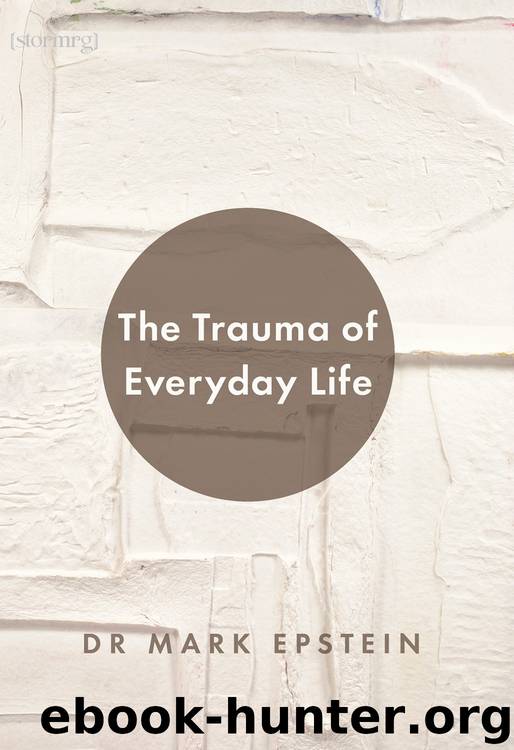The Trauma of Everyday Life by Epstein Mark

Author:Epstein, Mark [Epstein, Mark]
Language: eng
Format: epub, mobi
Publisher: Hay House
Published: 2014-07-06T14:00:00+00:00
The Buddha would have agreed with Sherry Turkle. In the moment of his childhood memory he looked up from his smart phone and unhooked himself from his obsessive self-preoccupation. He, too, was trying to be like everybody else, or at least like the very best holy man he could imagine. But, lucky for him, he had a spontaneous experience that surprised him. He felt the fear that often provokes a phobic response, but his curiosity protected him. He looked at his fear and it did not make sense. He began a conversation with himself that continued for the next several weeks and that culminated in his enlightenment. And he continued that conversation for many more years, with Yasa as one of his first contacts.
While the Buddha erred on the side of self-denial, not self-indulgence, his core understanding pertained to both. Up until his childhood memory, the Buddha had not recognized that the seeds of liberation were already present within. The spontaneous arising of his memory provoked a recalibration of his psyche. It resolved his conflict over how to relate to himself. If the joy he remembered under the rose-apple tree was not a result of the blind pursuit of pleasure, if it had nothing to do with sensual desires, then it must be intrinsic to the Buddha’s own nature. If it was intrinsic to his nature, then there was no need to turn himself into a stone or a dry, sapless piece of wood, no need to erode the physical and mental substrate of his being. If this joy was a key to enlightenment, then his approach had to change. How could he use this remembered joy to guide him on his path? He could investigate it rather than trying to wipe it out: He could engage it in conversation.
The first thing the Buddha decided was that if he wanted to sustain his joy, he needed to eat. “It is not possible to attain that pleasure with a body so excessively emaciated. Suppose I ate some solid food—some boiled rice and bread?”20 At this point in the story, a maiden appeared, a young village woman named Sujātā, who brought him some porridge or rice pudding called kummāsa. The five ascetics who had been cheering him on grew disgusted when they saw him with her. They thought he had gone soft, lost his edge, become a convert to some other guru, the way we might feel when a respected professor suddenly discovers the New Age. “The monk Gotama has become self-indulgent, he has given up the struggle and reverted to luxury,”21 they cried. They left him and wandered on, searching for new inspiration. In the legends that have grown up in Buddhist culture over the years, this incident has taken on special meaning. As if to drive home the relationship between the Buddha’s childhood memory and the return of his lost mother, Sujātā is described in one famous text as having been the Buddha’s mother in five hundred previous existences.22 In
Download
This site does not store any files on its server. We only index and link to content provided by other sites. Please contact the content providers to delete copyright contents if any and email us, we'll remove relevant links or contents immediately.
Rewire Your Anxious Brain by Catherine M. Pittman(18643)
Talking to Strangers by Malcolm Gladwell(13346)
The Art of Thinking Clearly by Rolf Dobelli(10451)
Mindhunter: Inside the FBI's Elite Serial Crime Unit by John E. Douglas & Mark Olshaker(9318)
Becoming Supernatural by Dr. Joe Dispenza(8199)
Change Your Questions, Change Your Life by Marilee Adams(7758)
Nudge - Improving Decisions about Health, Wealth, and Happiness by Thaler Sunstein(7690)
The Road Less Traveled by M. Scott Peck(7594)
The Lost Art of Listening by Michael P. Nichols(7490)
Mastermind: How to Think Like Sherlock Holmes by Maria Konnikova(7320)
Enlightenment Now: The Case for Reason, Science, Humanism, and Progress by Steven Pinker(7306)
Win Bigly by Scott Adams(7183)
The Way of Zen by Alan W. Watts(6600)
Daring Greatly by Brene Brown(6501)
Big Magic: Creative Living Beyond Fear by Elizabeth Gilbert(5754)
Grit by Angela Duckworth(5604)
Ego Is the Enemy by Ryan Holiday(5413)
Men In Love by Nancy Friday(5232)
The Laws of Human Nature by Robert Greene(5171)
